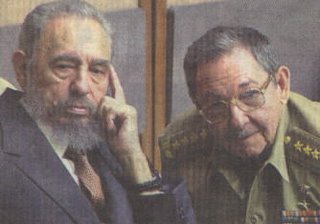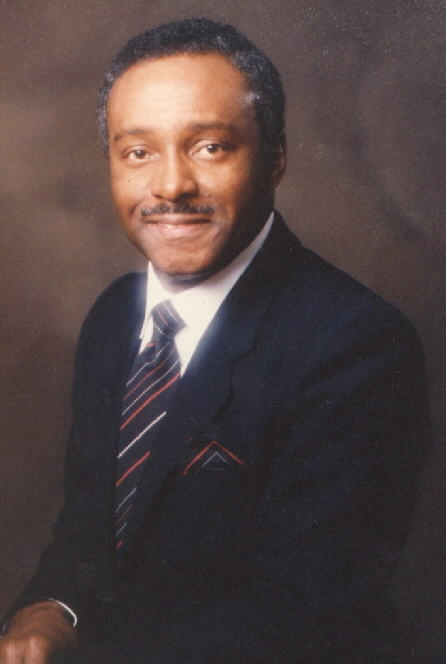CUBA-POST CASTRO BROTHERS’ RULE: Should Afro-Cubans be celebrating?
(Photos: METRO-AFP/AP)
Reading Sarah Getty's article in Wednesday's, August 2, 2006 edition of the Metro-UK: "Sick Castro gives power to brother," and also watching evening news on television and seeing images of Cuban exiles in Miami, Florida celebrating in the streets about Fidel Castro’s’ temporary handing over of power to his younger brother Raul, I noticed there were only a couple of Afro-Cubans of dark complexion. The rest appeared to be whites of Hispanic descent and mulattos (offsprings of blacks and whites) and mestizos (persons of mixed blood). And I wondered, if the Afro-Cubans were actually exiles themselves, or merely offsprings of previous generations of older Afro-Cubans in exile?

My mind reflected back on the gruesome pictures I saw many years ago of blacks in Cuban during the U.S. supported Batista regime that showed Afro-Cubans being brutalized with attack dogs and high pressure water hoses before the Castro regime came into power in January 1959. Of course, those were some of the same types of brutal and oppressive tactics and strategies used in the U.S. southern states against African Americans, or Negroes as was the proper term at that time.
And so, I pondered over whether those young Afro-Cubans really understood just what they were celebrating and being so jubilant about in light of the severe discrimination their ancestors had been subjected to by some of the same elite Hispanic-Cubans they now find themselves standing beside on the streets of Miami, prematurely, celebrating Castro’s demise or exit from power. Possibly, they have forgotten that their mothers and fathers and other blacks had to enter through back doors of the white-Hispanic owned homes and establishements; were banned from entering most public places; couldn’t get descent employment; and they certainly didn’t have access to health care or education.
 But all that changed under Fidel Castro and his brother Raul. This is not to say there is no racism or discrimination in Cuba today; quite the contrary. One can change laws, but it’s difficult to change hearts and minds, and enbedded prejudices and biases.
But all that changed under Fidel Castro and his brother Raul. This is not to say there is no racism or discrimination in Cuba today; quite the contrary. One can change laws, but it’s difficult to change hearts and minds, and enbedded prejudices and biases.However, it is not at all a reach to state that social conditons have vastly improved for the Afro-Cubans and the masses as a whole, or the humble people, since the Castros came to power; despite the 46 years of embargo that have denied the Cuban people the opportunity to develope a robust and flourishing economy. unquestionably, they all are much better off today, when compared to social conditions under the Bastista regime.
For example, an early assessment of the revolutionary changes made in combating discrimination and racism, is chronicled in an article by Albert Weisbord, What's Going On In Cuba (From the magazine "La Parola del Popolo" April - September 1960): “Racism has been given a mortal blow in Cuba. Negros everywhere occupy an important position. They make up about 50% of the army. They are 10% - 20% of the officialdom; Cuba's national hero is the Negro, General Maceo; the composer of their new national hymn of the 26th of July is a Negro, Cartaya; the head of the Cuban army is a Negro, Juan Almeida, etc. Intermarriage is common and any segregation or discrimination is severely attacked.”
Thus, when and if the Castro brothers and their regime should lose power, what type government and society will the white-Hispanic Miami Cuban exiled elites put into place? Will it be the same old "de je vu" they or their ancestors once enjoyed during the Batista era? And- perhaps-long to recapture those good-old-days-of-yo?
As J.A. Sierra rightly and insightfully asked in his essay, History of Cuba: “Will institutional U.S.-style racism return to Cuba once Castro is gone?” That is the million dollar question that Afro-Cubans should be asking their white-Hispanic elite brothers and sisters that hold the power base in Miami, and no doubt, will play a significant role in the future of Cuba if and when circumstances make way for them to be repatriated to their homeland.
J.A. Sierra provides deeper insight into just how racial relations will probably be among Afro-Cubans and whites of Hispanic descent, in one of his quotes: In the 1990s, wrote Pérez Sarduy, "the political and racial division between Cubans on the island (mainly black and brown) and Cubans in Miami (overwhelmingly white) was made apparent in the receptions each group gave South African leader Mandela: in Cuba he was welcomed as a hero, but not so in Miami. In June 1990, shortly before a planned visit to Florida as part of his U.S. tour, four Cuban American mayors of Miami signed a letter declaring Nelson Mandela persona non grata. Any sign of support for Cuba was to be denounced. (Mandela had often expressed appreciation for Cuba's solidarity in ending apartheid.) The African American community declared a boycott of Miami, which was ineffective, and demanded an apology from the Cuban Americans, which was never offered. The conflict also signaled divisions among Cuban Americans, as Afro-Cubans distanced themselves from Cubans of Hispanic descent."
Hence and unquestionably, it is paramount that Afro-Cubans constantly remind their fellow Cubans of social historian Fernando Ortíz’ words of 1942: "On guard, black man! On guard, white man!" "All Cubans together, on guard! And stand forever close together, for our liberties and our lives are in danger." Without the black, Cuba would not be Cuba.
But, if the tenuous relationship that currently exists among white-Hispanic and black Cuban exiles in Miami today is an example of what is to come upon their return to Cuba proper, post-Castros, then I believe the young Afro-Cuban exiles would put more in depth thought into just how quick they were/are to jump on the bandwagon to wish for the Castro’s rapid exit from power and eventual demise. You decide!


______________________________________________________________________________
References: http://www.weisbord.org/WhatsGoingOn.htm; http://www.blackwebportal.com/nuforums/viewmessages.cfm?Forum=13&Topic=992;
http://www.historyofcuba.com/history/race/RaceIntro.htm
_




0 Comments:
Post a Comment
Subscribe to Post Comments [Atom]
<< Home